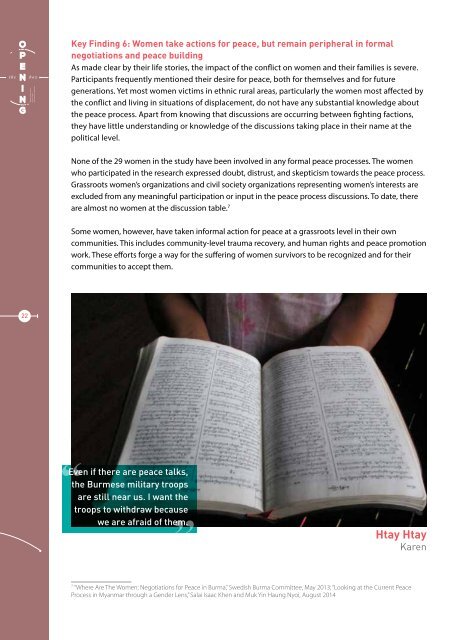Experiences
Asia_AJAR-2015-09-23-Opening_the_Box-en
Asia_AJAR-2015-09-23-Opening_the_Box-en
You also want an ePaper? Increase the reach of your titles
YUMPU automatically turns print PDFs into web optimized ePapers that Google loves.
Key Finding 6: Women take actions for peace, but remain peripheral in formal<br />
negotiations and peace building<br />
As made clear by their life stories, the impact of the conflict on women and their families is severe.<br />
Participants frequently mentioned their desire for peace, both for themselves and for future<br />
generations. Yet most women victims in ethnic rural areas, particularly the women most affected by<br />
the conflict and living in situations of displacement, do not have any substantial knowledge about<br />
the peace process. Apart from knowing that discussions are occurring between fighting factions,<br />
they have little understanding or knowledge of the discussions taking place in their name at the<br />
political level.<br />
None of the 29 women in the study have been involved in any formal peace processes. The women<br />
who participated in the research expressed doubt, distrust, and skepticism towards the peace process.<br />
Grassroots women’s organizations and civil society organizations representing women’s interests are<br />
excluded from any meaningful participation or input in the peace process discussions. To date, there<br />
are almost no women at the discussion table. 7<br />
Some women, however, have taken informal action for peace at a grassroots level in their own<br />
communities. This includes community-level trauma recovery, and human rights and peace promotion<br />
work. These efforts forge a way for the suffering of women survivors to be recognized and for their<br />
communities to accept them.<br />
22<br />
Even if there are peace talks,<br />
the Burmese military troops<br />
are still near us. I want the<br />
troops to withdraw because<br />
we are afraid of them.<br />
Htay Htay<br />
Karen<br />
7<br />
“Where Are The Women: Negotiations for Peace in Burma,” Swedish Burma Committee, May 2013; “Looking at the Current Peace<br />
Process in Myanmar through a Gender Lens,” Salai Isaac Khen and Muk Yin Haung Nyoi, August 2014


